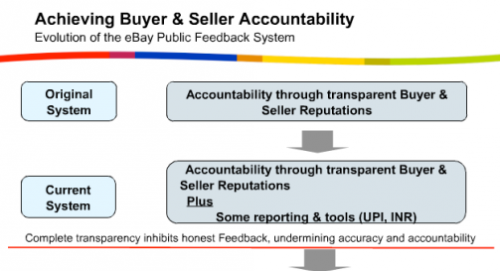Online Reputation Systems
An online reputation system is a tool that combines collective feedback from users about various products and/or companies in order to share that information with other users. This is done to harness trust in various products and services, and to provide comfort for users concerning the validity and reliability of the providers. Reputation systems incorporate both user feedback and external statistics (such as the overall number of items purchased) to provide a picture of the product for potential customers. Oftentimes, reputation systems incorporate an incentive system that encourages users to try and garner a good reputation amongst their peers.
Online reputation systems do two things: they facilitate trustful interactions between strangers on the Internet and they help to ease the problem of information overload.
Contents
Trust
Although not flawless, online reputation systems give "a reasonable indicator of a person's relative trustworthiness and reliability" [1]. Online reputation systems are important because trust is a greater problem in online interactions than it is in offline interactions. In the online realm, normal cues usually used for trust, such as body language, tone of voice, and facial expression, are missing. In addition, the anonymity of the internet requires that each user builds up a reputation starting from nothing. Since there can be no outside sources to validate a person's reputation, online reputation systems compel users even further to build a good reputation from the beginning. Reputation systems have developed a way for users within a community to know about the trustworthiness of other users. By making reputations for various goods visible, trust is fostered amongst users.
Information overload
The second component to online reputation systems is easing information overload. With all the information and feedback users can leave on the Internet, online reputation systems help consolidate and summarize the statistics. This all-inclusive approach to reputation-building also ensures that all interactions are recorded and treated as important, ideally.
Concerns with Reputation Systems
There are some issues with implementing an online reputation system, both in terms of trust and in terms of information overload. Online reputations systems are unable to be implemented unless users are willing and able to to present user feedback. Without participation from its users, there is no information for the systems to present. The initial barrier to starting an online reputation is quite high. The first time a user joins an online setting that uses reputation systems, they are starting with a blank slate. Therefore other users maybe unwilling to conduct transactions with someone who has no reputation. This can create difficulties for creating a reputation when there is no basis for other users to trust them.
Ethical Implications
A large ethical concern with reputation systems revolves around the fact that users typically are pseudo-anonymous. On such popular systems as eBay, where items are purchased from around the world, it is very easy for users to create fake accounts which allow for them to pretend to sell items in order to collect a profit. By having the ability to continuously create new accounts, it is very hard to hold users accountable for their actions. The question of anonymity in online environments and the potential harm it can cause in real life is very evident in reputation systems and it can be seen that the potential for deceitful, malicious behavior through the violation of other users' trust is very real in these environments.
In addition, the scoring systems employed by reputation systems can be manipulated into giving inaccurate portrayals of a user's online behavior history. By having multiple accounts on a reputation system's community, users can give themselves a good reputation by creating records of false interaction between two accounts of their own, which is essentially a way of cheating the system. This kind of behavior is ethically wrong due to the fact that it is lying as well as having implications in real life, since other users might use that information to make decisions.
Reputation systems, as a source of information accuracy, may not always live up its standards of better quality information. Higher recommended sources may not always be the most accurate, since these sources are rated in terms of consensus, rather than direct verification. Something that is highly rated by a lot of users, particularly things regarding medical diagnosis and other databases of information, is not always the information that might be approved by doctors or other professionals.
Types of systems
There are many different types of systems, each with various advantages and disadvantages. Some systems rate users on a numerical scale, others contain a collection of detailed responses, and others still can be a combination of those and other techniques. Also response can be voluntary or non-voluntary, depending on the design of the system.
Online reputation systems are used in many areas, including but not limited to
- Electronic markets
- News sharing websites
- Recommender systems
Online reputation systems have been thoroughly and scientifically analyzed in order to determine what makes a good online reputation system. Ming Kwan and Deepak Ramachandra, members of technology thinktank nGenera Insight, suggested certain guidelines for creating such a system. They suggest that a good system makes users accountable for their actions. This gives them an incentive to behave well in an online setting. Another important feature of a good online reputation system is having a system where reputation is hard to achieve, making a good reputation more valuable. Finally, they suggest providing tools for users to validate and authenticate other users so that trust may be established[2].
Examples of Systems
Some examples of various reputation systems include the following:

